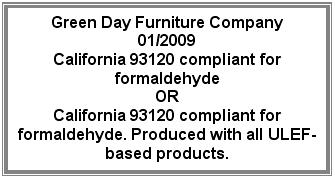Airborne Toxic Control Measure
Since 2009, the California Airborne Toxic Control Measure (ATCM), enforced by the California Air Resources Board (CARB), has established formaldehyde emission standards for hardwood plywood (HWPW), particleboard (PB) and medium density fiberboard (MDF) (together, composite wood products), and requires finished goods to be sold in California to use composite wood products that comply with the emission standards.
Covered Parties
Manufacturers, importers, distributors, fabricators and retailers of composite wood products are required to comply with the ATCM. A “fabricator” is defined as anyone that uses composite wood products to make finished goods.
The ATCM standards are applicable to formaldehyde emission for the following composite woods that are sold, offered for sale, supplied, used, or manufactured for sale in California.
- Hardwood plywood – HWPW
- Particleboard – PB
- Medium Density Fiberboard - MDF
Covered Products
These composite wood products are commonly used to make the following items. Fabricators of finished products must also use composite wood products that comply with the emission standards.
- Furniture
- Cabinets
- Shelving
- Countertops
- Flooring
- Molding in homes
Requirements of the ATCM
The ATCM establishes two phases for compliance with the emission standards.
(Click image to enlarge)
In addition, The ATCM also contains the following requirements.
- A third party testing lab approved by CARB must certify compliance with emission standards unless an exemption has been granted for the use of no-added formaldehyde based resin (NAF) or ultra-low emitting formaldehyde based resins (ULEF).
- Importers, distributors, fabricators and retailers must take “reasonable prudent precaution” to ensure that the composite wood products and/or finished goods comply with the emission standards. “Reasonable prudent precautions” means, at a minimum, instructing each supplier that the goods they supply must comply with the applicable emission standards, and obtaining written documentation from each supplier stating that this is so.
- The bill of lading or invoice must include a statement of compliance.
- A label with a stamp, tag, sticker or bar code must appear on every finished good produced, or on every box containing finished goods.
- The information contained on the label must include:
- Fabricator’s name
- Production date
- Markings that the product was made with HWPW, PB, and MDF that complies with applicable emission standards.
- Indicate the use of NAF or ULEF if this is the case for all the composite wood products used in the finished good.

- Records showing the dates of purchase, supplier of the composite wood product, and precautions taken to ensure compliance should be kept at least two years.
It is possible that CARB or local air district personnel may inspect the facilities, audit records, and secure samples for compliance testing.
Vendor Requirements
Retailers are required to maintain records on file for a minimum of two years. In the course of inspecting a retailer, ATCM can ask to see the chain-of-custody documents that verify the emission characteristics of the products being offered for sale.
In addition, The Formaldehyde Standards Act (FSA) was passed in the U.S. Congress in June 2010. This act adopted the standards under the ATCM at a federal level. The U.S. Environmental Protection Agency has been tasked under the FSA to establish regulations for the standards by January 1, 2013.
Therefore, each vendor must provide the following document for approval to ship composite wood products and finished goods containing composite wood products. Please note that all three requirements must be forwarded to the Foreign Buying Office the vendor is in contact with prior to shipping for approval.
- A soft copy of the accredited third party test results on composite panels used in finished goods in which the composite wood panel has not been altered in the creation of the finished good.
Or
- A new test on any finished good in which the composite wood panel has been altered from it’s original state in the creation of the finished good.
- Samples of required ATCM labeling that will be applied to finished goods.
- Notation on the vendor invoice that the composite wood products or finished goods comply with the applicable Phase 1 or Phase 2 emission standards.
